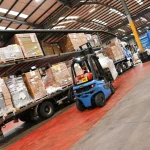
Maximizing Efficiency: Why Wooden Pallets Are Ideal for Avocado Exports in Kenya
Kenya has emerged as one of the world’s leading exporters of avocados, with the fruit becoming a key player in the country’s agricultural export portfolio. The avocado industry is not only a major source of revenue but also a vital contributor to job creation and economic growth. As demand for Kenyan avocados continues to grow in international markets, optimizing the supply chain has become a critical focus for exporters. One of the most effective ways to achieve this is by using wooden pallets for packaging and transportation.
This guide provides an in-depth look at why wooden pallets are an ideal solution for avocado exports in Kenya, focusing on their role in improving efficiency, reducing costs, and supporting sustainability goals.
Understanding Kenya’s Avocado Export Industry
Kenya is currently ranked among the top avocado exporters globally, with countries like China, Europe, and the Middle East being key markets. The Hass and Fuerte avocado varieties dominate exports due to their long shelf life and superior quality.
The industry has seen exponential growth over the past decade. In 2023 alone, Kenya exported over 80,000 metric tonnes of avocados, generating approximately KSh 18 billion in revenue. This rapid expansion has highlighted the need for efficient logistics solutions to ensure that avocados reach international markets fresh and undamaged.
Why Packaging Matters in Avocado Exports
The journey of avocados from farms in Kenya to supermarket shelves abroad is complex and involves multiple stages:
-
Harvesting – Picking mature fruits at the right time to ensure optimal ripeness upon arrival.
-
Post-Harvest Handling – Washing, sorting, and packing avocados to maintain hygiene and quality standards.
-
Cooling – Pre-cooling the fruits to extend shelf life during transit.
-
Transportation – Shipping avocados via road, air, or sea to their final destination.
At every stage, packaging plays a critical role in protecting avocados from bruising, contamination, or spoilage. Wooden pallets have become an essential component of this process due to their ability to enhance efficiency and reduce risks during transportation.
Benefits of Wooden Pallets for Avocado Exports
1. Cost-Effectiveness
Wooden pallets are significantly more affordable than other alternatives like plastic or metal pallets. For Kenyan exporters operating on tight profit margins, this cost advantage can make a big difference.
-
Lower Upfront Costs: Wooden pallets are cheaper to produce and purchase compared to plastic pallets, which require expensive raw materials like polypropylene or polyethylene.
-
Reusability: While wooden pallets have a shorter lifespan than plastic ones, they can still be reused multiple times with proper care, further reducing costs over time.
2. Durability and Load-Bearing Capacity
Avocados are delicate fruits that require careful handling during transit to avoid bruising or damage. Wooden pallets are strong enough to support heavy loads while providing stability during transportation.
-
Shock Absorption: Wood is naturally better at absorbing shocks compared to rigid plastic materials, which helps protect avocados from impact damage during handling or transit.
-
Stacking Efficiency: Wooden pallets allow for easy stacking of crates or boxes, maximizing space utilization in shipping containers.
3. Environmental Sustainability
Sustainability is becoming a key consideration for global buyers and consumers alike. Wooden pallets offer several environmental advantages:
-
Renewable Resource: Wood used for pallets is often sourced from sustainably managed forests or recycled wood materials.
-
Biodegradability: Unlike plastic pallets that take centuries to decompose, wooden pallets break down naturally when disposed of.
-
Recyclability: Damaged wooden pallets can be repurposed into mulch, wood chips, or even new pallets.
By adopting wooden pallets, Kenyan exporters can align with international sustainability standards and appeal to eco-conscious buyers.
4. Improved Airflow and Temperature Control
Proper temperature regulation is essential when transporting perishable goods like avocados over long distances. Wooden pallets facilitate better airflow around packed crates compared to plastic alternatives.
-
Ventilation: The gaps between wooden slats allow air circulation around the avocados, helping maintain consistent temperatures throughout transit.
-
Moisture Regulation: Wood naturally absorbs excess moisture, reducing the risk of condensation that could lead to spoilage.
5. Compliance with International Standards
Many countries require imported goods to comply with specific packaging standards aimed at preventing the spread of pests or diseases through wood products.
-
ISPM-15 Certification: Most wooden pallets used for exports are treated according to International Standards for Phytosanitary Measures No. 15 (ISPM-15), ensuring they are pest-free and meet global trade requirements.
-
Traceability: Wooden pallets can be stamped with identification codes that provide traceability throughout the supply chain.
Challenges Facing Avocado Exporters in Kenya
Despite the benefits of wooden pallets, Kenyan avocado exporters face several challenges:
-
High Freight Costs: Shipping rates have risen globally due to increased demand for containerized cargo space.
-
Logistical Bottlenecks: Delays at ports or border crossings can disrupt supply chains and affect product quality.
-
Quality Control Issues: Ensuring consistent quality across large volumes of exported avocados remains a challenge for many producers.
-
Climate Change Impacts: Erratic weather patterns are affecting avocado yields and increasing post-harvest losses.
While these challenges persist, adopting efficient packaging solutions like wooden pallets can help mitigate some of these risks by improving handling efficiency and reducing spoilage rates.
Best Practices for Using Wooden Pallets in Avocado Exports
To maximize the benefits of wooden pallets, Kenyan exporters should follow these best practices:
-
Invest in High-Quality Pallets: Choose durable wooden pallets that meet international standards such as ISPM-15 certification.
-
Proper Loading Techniques: Ensure that crates or boxes are evenly distributed on the pallet to prevent tipping or shifting during transit.
-
Regular Maintenance: Inspect wooden pallets regularly for signs of damage such as cracks or splinters that could compromise their structural integrity.
-
Optimize Storage Conditions: Store loaded pallets in cool, dry environments before shipping to maintain avocado freshness.
-
Train Workers on Handling Procedures: Educate workers on proper pallet handling techniques to minimize damage during loading or unloading.
Conclusion
As Kenya continues its ascent as a global leader in avocado exports, optimizing logistics processes will be key to sustaining growth and competitiveness in international markets. Wooden pallets offer a practical solution for addressing many of the challenges faced by exporters, from cost savings and durability to environmental sustainability and compliance with global standards.
By integrating wooden pallets into their supply chain strategies, Kenyan avocado exporters can enhance efficiency while ensuring their products reach consumers fresh and intact—ultimately solidifying Kenya’s reputation as a reliable supplier of high-quality avocados on the global stage.





Add a comment